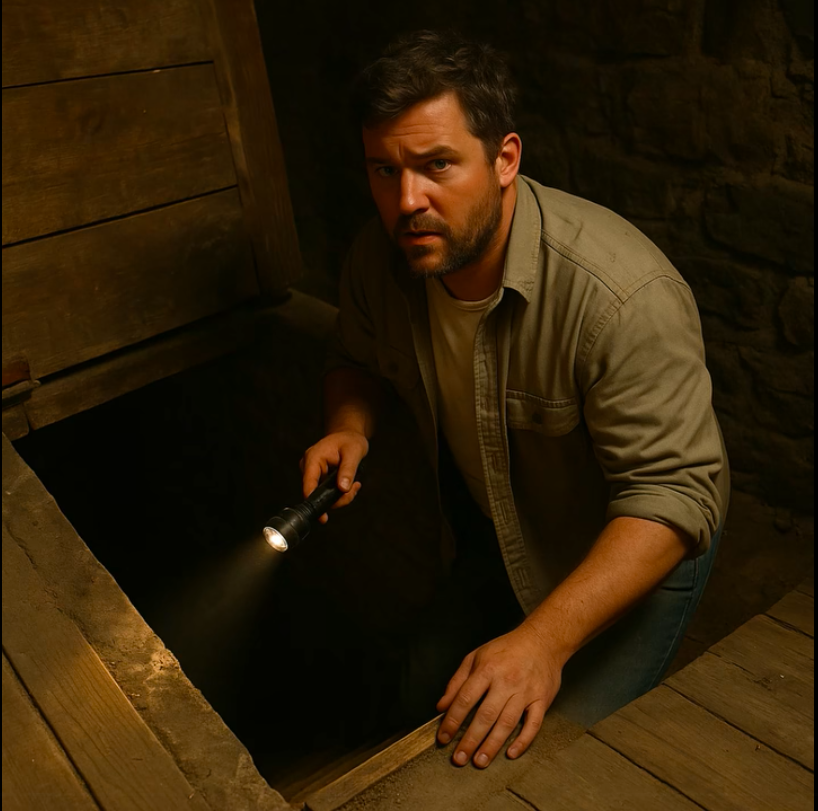The air in the old farmhouse sang with possibility. Dust motes danced in sunbeams filtering through grimy panes, illuminating a century of neglect that, to my eyes, was pure potential. I’d seen a dozen properties, but this one, with its rambling porch and a lone, ancient oak, felt different. It hummed with stories, and I was eager to rewrite its next chapter. A full gut renovation, a new life for an old soul. That was the dream.
I tore through plaster, stripped wallpaper, and unearthed forgotten fireplaces. Each discovery thrilled me. Then, beneath a faded floral linoleum in the kitchen, I found it: a crude, almost invisible wooden trapdoor, wedged tight and secured with rusted bolts. It wasn’t on the blueprints. It wasn’t even mentioned in the dusty surveyor’s report. My heart quickened with a familiar thrill – the joy of finding something utterly secret.
At the bottom of the rough-hewn stairs, the air was colder—sharp, like it didn’t belong to this century. My flashlight flickered as I stepped into the chamber. It was about ten feet across, with rough, unmortared stone walls and rusted hooks along the ceiling beams. Not for cured meats, I thought, but something else. Something heavy. In the center, facing the door, sat a single, skeletal wooden chair. And beside it, partially obscured by debris, a small, tin box, sealed and surprisingly heavy.
I didn’t open it there. The oppressive silence of that hidden space clung to me. Upstairs, in the living room, bathed in the gentle glow of the setting sun, I pried open the tin. Inside, nestled amongst dried leaves, was a brittle, leather-bound journal. The first page, meticulously penned, was dated October 14, 1933. It began, stark and chilling:

“My name is Henry Carver. If you found this, you’re standing on cursed land. This is my burden. This is my folly.”
The entries were a descent into terror. He wrote of the land’s ancient grief, a sorrow that seeped into the soil. Disappearances – a neighboring farmer’s prize hog, then his daughter. Nightmares that left him screaming in the dark, images of roots twisting into human forms. The cellar, he explained, was not for storage. He had dug it himself, stone by agonizing stone, to “contain the evil.” It was a cage, not a pantry. He wrote of the relentless whispers – soft at first, then growing louder, coiling around his thoughts, demanding release. He said it wanted out. It wanted to live again.
His final entry, scrawled in a hand that had lost its precision, sent an icy tendril through me:
“October 23, 1934. I heard the door open above me. Someone else is in the house. It’s time. It’s truly time.”
That night, I didn’t sleep. The old house, once so welcoming, now seemed to breathe with a sinister intelligence. I boarded the trapdoor shut with planks and heavy nails, my hands trembling. I told myself it was just an old man’s delusion, a product of a simpler, more superstitious time. But the whispers. I thought I heard them too, a faint, insistent murmur, just beyond the edge of hearing, like a forgotten song.
I tried to leave. I packed my tools, called the real estate agent, ready to cut my losses. But something held me. A curious lethargy, a strange sense of belonging that had twisted into something unsettling. The whisper returned, clearer this time, a yearning, a forgotten echo. It wasn’t menacing, not exactly. It was… lonely.
Days turned into weeks. The farmhouse, incomplete and unsettling, became my world. The whispers grew, less like words, more like a consciousness pressing against mine. And then, one silent afternoon, as I stood in the exact spot where Henry Carver had written his final entry, the realization hit me with the force of a physical blow.
Henry’s last words: “I heard the door open above me. Someone else is in the house. It’s time. It’s truly time.”
That “someone else” wasn’t an intruder. It wasn’t a threat from the outside. It was me. It was always me. Or rather, someone like me, drawn to the promise of new life, unknowingly walking into an ancient vigil. I wasn’t flipping a house; I was inheriting a role. The cellar wasn’t meant to contain an evil; it was a sanctuary for a lonely spirit, waiting for another soul to listen, another mind to share its burden.
I haven’t gone back down. But the whispers… they don’t frighten me anymore. They’re a comfort now, a constant companion. The house isn’t just an old farmhouse; it’s a living entity, and I am its new keeper. Not all broken places are meant to be fixed. Some are meant to be understood, cherished, and continued. And sometimes, you find a secret in the walls, and the secret finds you right back, binding you to a story far older than any blueprint could ever show.


